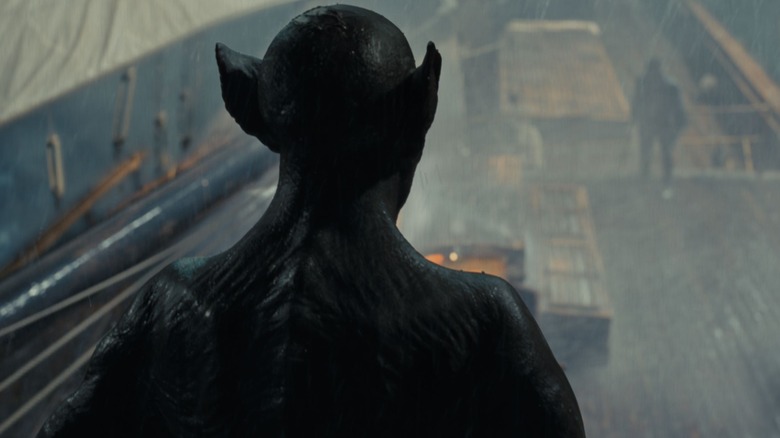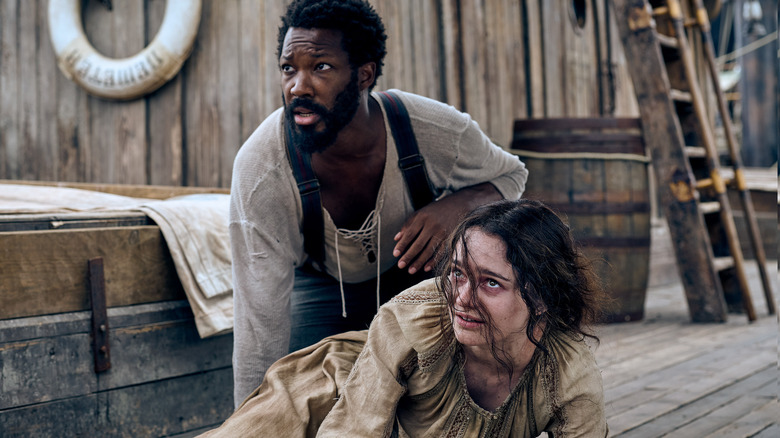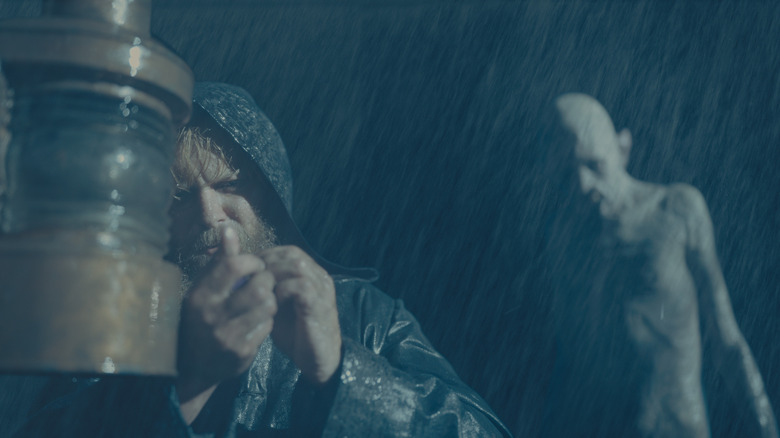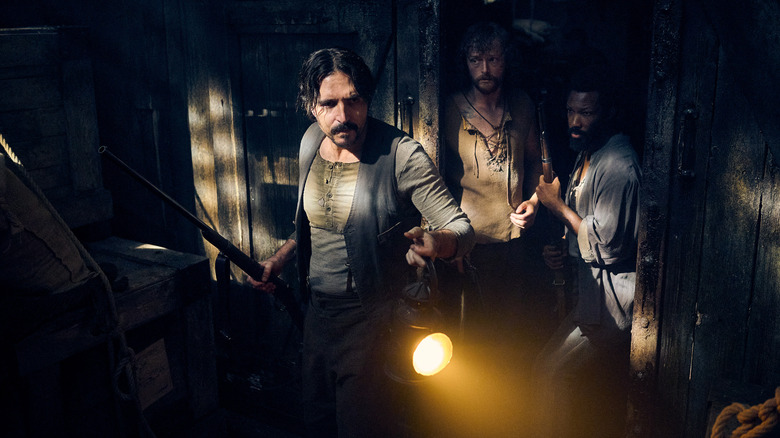How The Last Voyage Of The Demeter Changes The Original Dracula Book
This article contains major spoilers for "The Last Voyage of the Demeter" (and also for the 126-year-old novel "Dracula.")
"The Last Voyage of the Demeter" opens on a very familiar sight to those who've read (or are even vaguely familiar with) Bram Stoker's original novel: a foundering ship run aground on an English beach in the middle of a fierce rainstorm, without a single living soul left on board. As concerned onlookers descend upon the wreck, the very atmosphere fills with dread and fear once more and more rescuers realize that something very wrong has happened here. The discovery of the captain's log only confirms these suspicions, documenting an innocuous enough voyage that started out like any other ... before ending in abject tragedy and death. As someone reads through each journal entry, we flashback to the last voyage of the Demeter to pinpoint exactly where the journey went awry.
This framing device might seem like yet another eye-rolling use of that trope where stories begin at their most exciting moment for the sake of a punchy and attention-grabbing start (an approach so overused these days that it has its own TV Tropes entry), but one can hardly fault author Bram Stoker for being ahead of the curve by over a century, nor blame director André Øvredal for hewing close to the single chapter he and writers Bragi F. Schut and Zak Olkewicz adapted from "Dracula" into a feature-length narrative. But while the broad strokes remain the same, the filmmakers were left with plenty of blank space to fill in the gaps with their own unique take on what exactly went down between ports on the high seas aboard the doomed Demeter.
Here's everything that "The Last Voyage of the Demeter" changed — and maintained — from the book.
Shifting perspectives
How's this for a novel approach to adapting a classic story? Rather than take, say, a breezy children's story like "The Hobbit" and stretch it past its breaking point into an epic trilogy of movies, "The Last Voyage of the Demeter" follows a very different mindset altogether. By expanding on a surprisingly short chapter of "Dracula," which intentionally keeps a key moment in Dracula's reign of terror at a chilling distance from readers, Øvredal was able to take full advantage of the creative freedom afforded to him to tell an entire story between those lines of text.
That meant taking certain liberties to flesh out the crew of the Demeter, which only amounted to five deckhands, a first and second mate, a cook, and the captain himself in the book. While at least two of the named crew have been translated faithfully to the screen — the early Dracula victim Petrofsky (Nikolai Nikolaeff) and the deeply superstitious Olgaren (Stefan Kapicic) — the film goes out of its way to expand on Captain Eliot (Liam Cunningham) along with the ship's first mate Wojchek (David Dastmalchian) and religious cook Joseph (Jon Jon Briones), introduce the captain's innocent grandson Toby (Woody Norman), and give us a new main lead in Corey Hawkins' ever-capable doctor Clemens and the added wrinkle of a stowaway in Aisling Franciosi's Anna.
Clemens and Anna aren't ever mentioned in the original novel, marking the biggest change the creative team on "Demeter" chose to make. Clemens provides audiences with a much-needed sympathetic figure to bring us into the story just as he joins the crew of the Demeter. Anna, meanwhile, serves an expositional purpose while folding in other layers of Dracula mythology — namely the vampire's "brides," one of whom traditionally is named Anna in some takes on the story.
A voyage from hell
The title of "The Last Voyage of the Demeter" may not include any specific mention of Dracula himself, but audiences know who the main attraction really is. Several legendary actors have taken their turns and put their own spin on depictions of the sinister Count, finally leading up to monster actor extraordinaire Javier Botet's portrayal. While his take on the centuries-old vampire as an animalistic nightmare fueled entirely by instincts of hunger might feel like a massive departure from the suave, seductive portrayal popularized by Bela Lugosi, this is actually the most significant way in which "Demeter" remains faithful to the novel.
"Dracula" recounts the Demeter's demise through the captain's secondhand scribblings, transcribing his crew's occasional encounters with their unwelcome guest partway through their sea voyage. After the crew increasingly become convinced of a mysterious "something" watching their every move, and despite initially keeping his frightening experience on the main deck to himself, Olgaren eventually comes to the captain and admits catching a glimpse of a "tall, thin man, who was not like any of the crew" who inexplicably vanished without a trace. This encounter plays out in "Demeter" almost exactly as Stoker originally wrote, though with the addition of Clemens on deck at the time, as well. The other named crew member, Petrofsky, maintains the book's distinction of being the first to die by Dracula's hands fangs. Attacked while on watch and leaving nothing but blood and his knife behind, the survivors have no choice but to carry on with their duties despite their mounting dread. As in the novel, a ship-wide search for Dracula turns up nothing while morale continues to plummet.
All the while, Dracula lurks in every shadow as an unseen presence — just as he does in this chapter of "Dracula."
London calling
While both "The Last Voyage of the Demeter" and the relevant chapter from "Dracula" both end with the wrecked ship and Dracula on English soil, this is where the film takes its biggest leaps to deliver a fittingly cinematic climax. In the novel, the helpless crew are slaughtered one by one until the captain is the last one alive. Increasingly convinced that the murders may have been committed by his first mate, who throws himself overboard in a fit of madness after searching the cargo hold for their tormentor (and probably finding him), the captain lashes himself to the ship's wheel in a heroic attempt to keep the ship on course at all costs. In the novel, it's implied that Dracula does this to Captain Eliot out of mockery, but in both versions, we get his tragically noble line that he hopes he's been "true to my trust" in carrying out his duties.
This is where the captain's log in the book abruptly ends. The film's radically different conclusion involves the remaining Demeter crew springing a trap on Dracula with Anna as bait after intentionally poking a hole in the ship's hull so it never reaches its destination and imperils even more innocents — all of which, of course, goes horribly wrong. Even Anna's last-minute improvisation to crash the ship's mast into Dracula and save Clemens is all for naught when the ship succumbs to the waves, the two are set adrift clinging to pieces of wreckage, and Dracula himself escapes unharmed and makes it to the mainland, setting up a perfect sequel with Clemens hunting Dracula through the streets of London.
In the end, the film feels like the epitome of what an adaptation should be: reverent, faithful, but ultimately and heart-stoppingly original.



